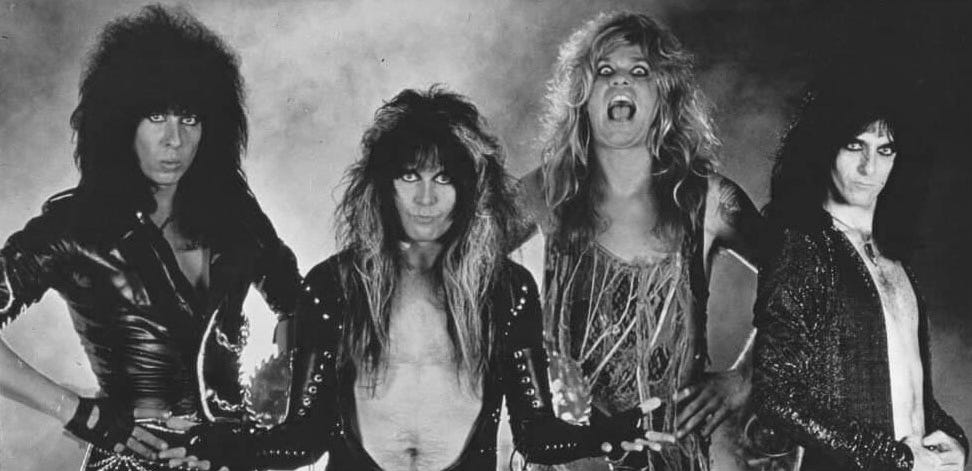W.A.S.P. (We Are Sexual Perverts or We Are Satans Preachers, depending on the source) was formed in 1982 in Los Angeles, California. The brainchild of vocalist and rhythm guitarist Blackie Lawless, the band’s initial lineup included Randy Piper on lead guitar, Rik Fox on bass, and Tony Richards on drums. Emerging from the fertile grounds of the L.A. metal scene, they quickly became known for their shock-rock stage antics and controversial lyrics. Influenced by Alice Cooper and Kiss, W.A.S.P. combined theatrical performance with a gritty, heavy metal sound that captured the rebellious spirit of the 80s.
😎 Happy we’re shining a light on this band? Say thanks with a tip! →
W.A.S.P.‘s musical style was a raw blend of heavy metal and glam rock, characterized by aggressive guitar riffs, anthemic choruses, and Lawless’s distinctive snarling vocals. Their early music was marked by provocative themes and a penchant for controversy, evident in songs like “Animal (F**k Like a Beast).” Over the course of the 1980s, W.A.S.P.‘s sound evolved to incorporate more polished production and complex arrangements, reflecting Lawless’s ambition to push beyond the confines of the glam metal genre.
Discography and Notable 80s Albums
“W.A.S.P.” (1984)
Released under Capitol Records, their self-titled debut album was a potent mix of raw energy and provocative imagery. Featuring standout tracks like “I Wanna Be Somebody” and “L.O.V.E. Machine,” the album received critical acclaim for its unapologetic approach and peaked at No. 74 on the Billboard 200. The album’s cover art, a striking image of the band members in full glam attire, became iconic in its own right. This lineup featured Blackie Lawless on vocals and rhythm guitar, Chris Holmes on lead guitar (who replaced Randy Piper before the album was recorded), Rik Fox on bass, and Tony Richards on drums.
“The Last Command” (1985)
Produced by Spencer Proffer and released on Capitol Records, “The Last Command” marked a significant step forward regarding production quality and musical complexity. It included hits like “Wild Child” and “Blind in Texas,” showcasing Lawless’s growth as a songwriter. The album climbed to No. 47 on the Billboard 200, solidifying W.A.S.P.’s reputation in the metal community. During this time, Steve Riley joined the band on drums, replacing Tony Richards.
“Inside the Electric Circus” (1986)
This album, also under Capitol Records, slightly departed from their earlier raw sound, incorporating more melodic elements. Despite mixed reviews, it featured memorable tracks like “9.5.-N.A.S.T.Y.” and their cover of Ray Charles’s “I Don’t Need No Doctor.” It reached No. 60 on the Billboard 200, further expanding their fanbase. The lineup for this album included Blackie Lawless (now also on bass after Rik Fox’s departure), Chris Holmes on lead guitar, Johnny Rod on bass, and Steve Riley on drums.
“The Headless Children” (1989)
A significant artistic leap, “The Headless Children” was produced by Lawless and released on Capitol Records. It was a darker, more politically charged album, addressing themes like war and social issues. The title track and “Mean Man” were standout songs, and the album peaked at No. 48 on the Billboard 200. Critics praised its maturity and depth, marking a high point in W.A.S.P.’s career. This lineup saw Frankie Banali on drums, replacing Steve Riley, and reaffirmed Johnny Rod on bass, with Holmes on guitar and Lawless on vocals and rhythm guitar.
Taylor Keahey suggested this artist for a future Dig Me Out podcast episode. Each month, our Patrons are presented with a selection of albums suggested by listeners and asked to vote for their favorite.
Influence and Legacy
W.A.S.P.‘s influence on the 80s metal scene is undeniable. They inspired a slew of bands with their theatrical performances and uncompromising attitude. Blackie Lawless’s stage presence and songwriting have been cited as influences by artists like Marilyn Manson and Rob Zombie. Lawless remained the constant driving force behind the band’s evolving sound and vision despite frequent lineup changes.
Throughout the 1990s and beyond, W.A.S.P. continued to release music and tour, maintaining a loyal fan base despite shifts in the musical landscape. Their albums, such as “The Crimson Idol” (1992) and “Still Not Black Enough” (1995), received acclaim for their ambitious concepts and thematic depth, further solidifying their legacy as innovators in the metal genre.
Many former members of W.A.S.P. pursued various projects after their time with the band. Randy Piper went on to form Animal, a band that carried on the heavy metal tradition. Tony Richards and Rik Fox also continued their careers in music, contributing to various projects and bands over the years.
W.A.S.P.’s legacy is also evident in its impact on live metal performances. Its elaborate stage sets, pyrotechnics, and shock-rock elements influenced countless bands in glam metal, shock rock, and beyond. Its audacious approach to live shows set a standard for audiences to expect from a high-energy, theatrical metal concert.
Numerous artists have covered their music, demonstrating the lasting impact of their songs. Bands such as Children of Bodom and Fozzy have paid homage to W.A.S.P. with their own renditions of classic tracks, further cementing the band’s influence on subsequent generations of metal musicians.
W.A.S.P.‘s contribution to the metal scene extends far beyond their 1980s heyday. Their daring approach to music and performance has left an indelible mark on the genre, inspiring countless artists and shaping the evolution of heavy metal. For fans of 80s metal, W.A.S.P. remains a symbol of the era’s raw energy and rebellious spirit, an essential piece of the larger puzzle of rock music’s evolution.





